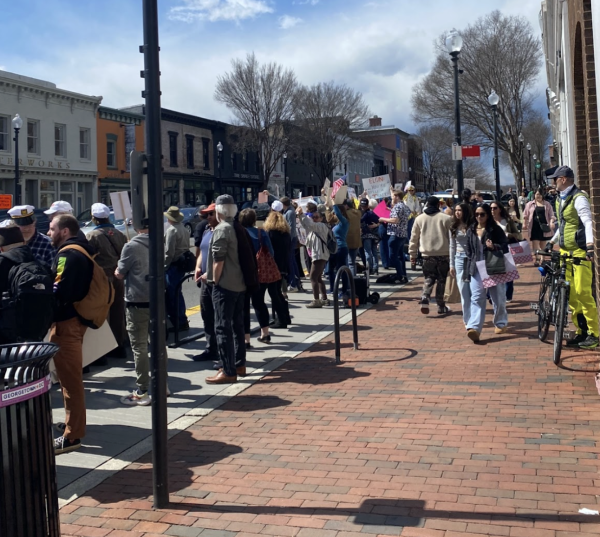Roughly 50 demonstrators protested CEO and businessman Elon Musk’s political activism and efforts to make cuts to federal government spending outside the Tesla showroom on M Street in the Georgetown neighborhood March 15.
Since President Donald Trump took office in January, Musk, who became CEO of Tesla in 2008, has acted as a special government employee advising the Department of Government Efficiency (DOGE), a White House initiative to enhance productivity within the federal government. The department has dismantled the U.S. Agency for International Development (USAID) and fired 24,000 probationary government employees as tens of thousands more are expected to be terminated.
Katie Taffe (CAS ’27) said she attended the protest out of frustration with the budget cuts and hoped to find a sense of community amid feelings of chaos.

“I wanted to disrupt my own feelings of isolation and lack of agency by expressing my voice with other people (both students and nonstudents) who refuse to stand and allow DOGE and the Trump administration to dismantle institutions and pillars of American democracy,” Taffe wrote to The Hoya.
The protest comes after the FBI launched a domestic terrorism task force to investigate vandalism at several Tesla dealerships and vehicles in what U.S. Attorney General Pam Bondi said could result in up to 20 years in prison for perpetrators.
Taffe said she felt uplifted in knowing other people are as frustrated with DOGE’s cost-cutting policies as she is.
“The protest was incredibly joyful, which was the entire premise of it. I’ve been to other protests where the mood is sad or downtrodden, but I felt that the people at the protest were happy to be protesting,” Taffe said. “There’s joy in finding community and knowing that there are other people who share your anger and your opinions, and that you’re not alone.”
A Jan. 20 executive order established DOGE from the U.S. Digital Service, formerly tasked with improving government services with modern technology. Despite widespread belief that Musk is at DOGE’s helm, Amy Gleason, a former health care consultant and senior advisor to the U.S. Digital Service, is the department’s acting administrator even as Musk continues to oversee the service.
Mackenzie Holian (CAS ’26), another protest attendee, said the cuts will ultimately detract from civil rights and foreign policy goals.
“I think DOGE should not be allowed to exist as a faux government agency,” Holian wrote to The Hoya. “Cutting DEI initiatives and USAID are objectively bad things to do from a social justice, international relations and psychological perspective.”
Taffe said the budget cuts are harmful to those in need and stand in opposition to ideals of charity and compassion.
“I have a lot of contempt for Musk and DOGE,” Taffe said. “Cutting programs or funding that help people that need it the most like USAID or Medicaid undermines what I believe are the tenets of American society: promoting the common good and looking out for each other.”
DOGE has said it intends to eliminate $1 trillion this fiscal year from the federal budget through its cuts, at least 20% of which Trump hopes to return to taxpayers. Observers have noted discrepancies in financial records, indicating DOGE may have exaggerated its savings by billions of dollars.
Holian said the shift in public opinion of Musk since he endorsed then-candidate Trump in July reflects evolving political dynamics in the United States.
“People were dancing and a lot of people driving Teslas were honking at us! It goes to show that the majority of people who own Teslas are probably liberals who bought the cars for environmental reasons before Musk went off the deep end,” Holian wrote.
Opposition to Musk stands in stark contrast to just three years ago, when the Inflation Reduction Act, a 2022 federal law which aimed to promote clean energy production, offered a $7,000 tax credit for those who purchased electric vehicles. Tesla, the world’s leading electric vehicle manufacturer, made billions off of these incentives by selling regulatory credits to other automakers.
Taffe said that, as an aspiring federal employee, she feels betrayed by such a drastic shift in what she perceived to be the federal government’s mission of service and aid.
“As someone who hopes to work in government postgrad, it is incredibly heartbreaking to see the government I spent my entire life aspiring to serve in contradict itself by turning its back on the citizens and people around the world who rely on its services and international aid,” Taffe said.
Taffe added that the protest inspired a sense of hope for the state of public expression in the United States.
“After leaving, I felt much better knowing that people aren’t afraid to protest and make their discontent and voices heard,” Taffe said.